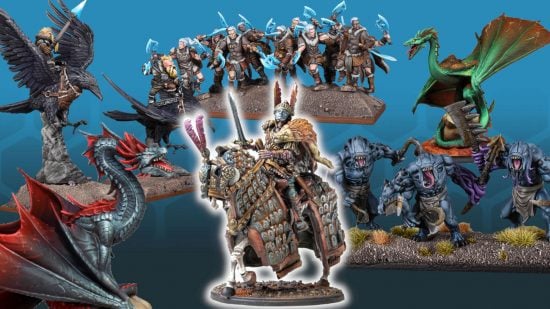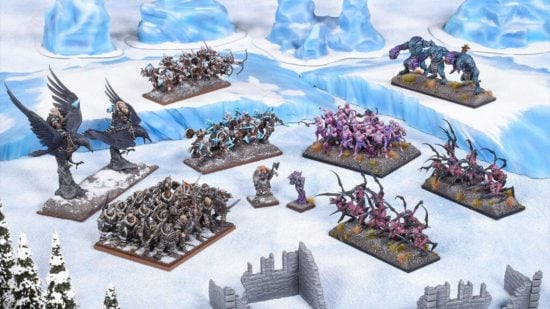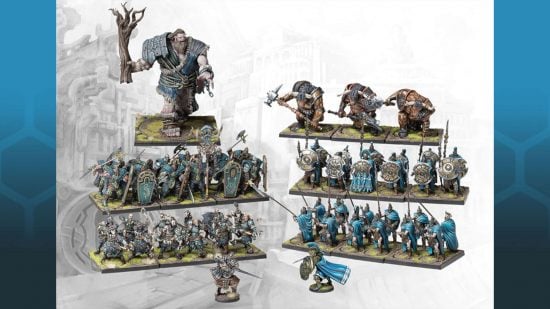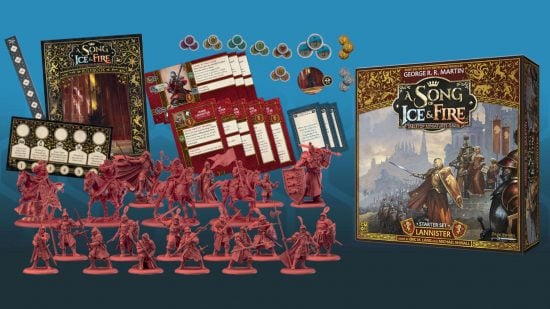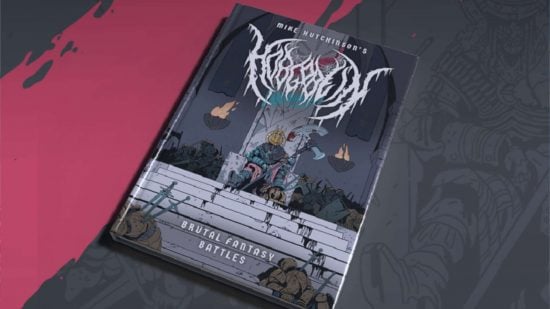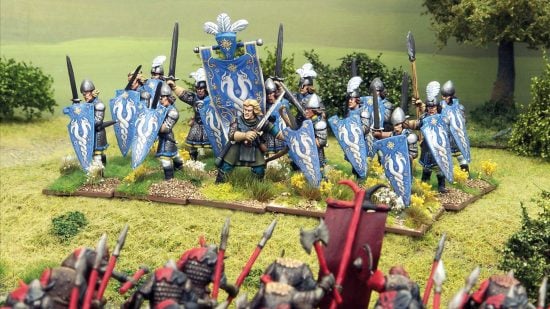Warhammer: The Old World marks Games Workshop’s return to the setting and game system that popularised fantasy wargames. While fans of classic Warhammer have plenty to celebrate, it’s far from the only rank and flank fantasy wargame out there. We’ve gathered five of the best that offer something distinctive, whether that’s fresh minis or a different style of tabletop strategy.
That said, if you do want to get involved with the main event for fantasy rank and flank battles, we have guides to Warhammer the Old World rules and the different Warhammer The Old World factions so you can see what all the fuss is about. But if you don’t care for Warhammer: The Old World…
These are the best fantasy wargames that aren’t Warhammer:
- Kings of War – fast, cheap, and good
- Conquest: Last Argument of Kings – plus-sized battles in a unique setting
- A Song Of Ice And Fire Tabletop Miniatures Game – wargame of thrones
- Hobgoblin – The fastest and loosest rank and flank wargame
- Oathmark – Generic fantasy with oodles of options
1. Kings of War
Fast, cheap, and good
Pros:
- Has a great range of affordable minis
- Plays fast
- Great competitive scene that doesn’t require official minis
- Free starter rules
Cons:
- No ability to react during opponent’s turns
- ‘Units’ are really single models with large bases
- Armies are huge, so there’s lots of painting
Kings of War minis started life as a budget alternative to Games Workshop products, but they’ve since gained a distinctive identity and their own set of rules. The rules, by former GW designer Alessio Cavatore, are easy to pick up and quick to play with, while still offering plenty of strategic depth, and the delight of chucking buckets of dice. The game has a well-earned place on our guide to the best miniature wargames.
Kings of War is much simpler than Warhammer The Old World. The active player is the only person who rolls dice, making rolls to hit, wound, and to try and break the leadership of enemy units. Rather than worrying about each individual soldier, units fight as one, and are all removed as one when the unit finally breaks.
This system has few fiddly bits to keep track of, and turns are fast playing. You may not feel that you’re really moving around ‘units’ of troops, just exceptionally large single models – but some fans really take to this, and construct large multi-model unit bases that are practically dioramas.
Conquest: Last Argument of Kings
Plus-sized battles in a unique setting
Pros:
- Gorgeous minis
- Incredible monsters
- Free rules, army lists, and online army builder
Cons:
- 38mm scale minis won’t fit with your existing terrain or other gaming systems
Conquest: Last Argument of Kings has just turned five years old, even releasing a special anniversary edition of one of its first ever monsters to celebrate. It uses the unusual, and very large, 38mm scale, meaning this game has massive presence on the tabletop.
Conquest has a very interesting Command system. At the start of each round, both players secretly assemble a stack of Command cards for the units in their army. This creates a fixed sequence in which you’ll be able to activate units – and also makes armies that use multiples of the same unit easier to control, since you have flexibility over which unit of the type indicated on the card you activate.
A Song of Ice and Fire Tabletop Miniatures Game
Wargame of Thrones
Pros:
- Distinctive character system
- Models for almost every Song of Ice and Fire character and military force
Cons:
- Based on the books, not the TV series, so there’s no Peter Dinklage model
- Totally tied to the IP
Produced by Cool Mini or Not, A Song Of Ice And Fire Tabletop Miniatures Game has a lavish line of models that recreate the named characters and armed forces of houses Baratheon, Stark, Greyjoy, Martell, Lannister, Targaryen, plus the Free Folk and the Nights Watch.
Even the non combat characters have a role to play, taking position on a separate tactics board through which they can exert influence on the units fighting on the battlefield. These NCUs can help muster reinforcements, panic enemy units, or help friendly units to retreat to safety, and have their own unique abilities.
The game is very closely wedded to the Song of Ice and Fire and its low magic, low fantasy setting, so it’s not a flexible system – but for fans of the books this is an easy recommendation.
Hobgoblin
The fastest and loosest rank and flank wargame
Pros:
- Miniature agnostic
- Free starter rules
- Fast paced and lightweight
Cons:
- Not finished yet!
Hobgoblin is a beautifully illustrated indie Wargame that is currently in pre-production after a successful Kickstarter campaign. You can get the complete quickstart rules from there for free.
Hobgoblin has an open-ended army building system, with players picking from a single list of unit types – Light Infantry, Cavalry, Chariots, and so on – that can be modified with a few upgrades. If you have any models that rank up into units, you can play a game of Hobgoblin using them.
That unified unit system is part of what makes the game quick and brutal; to work out how easy it is for one unit to wound another, you cross-reference the two unit types in a grid to find the target number for your dice. The full game promises extra complications through magic, cursed artifacts, and fortune cards, but for now this is an extremely stripped back system.
Oathmark
Generic fantasy with oodles of options
Pros:
- Flexible army composition
- Lots of expansions
- Miniature agnostic, but supported by a range of cheap minis
Cons:
- The most generic of generic fantasy
Oathmark is published by Osprey Games and written by Joseph A. McCullough, better known as the author of the fantasy skirmish game Frostgrave. It’s an open-ended fantasy mass battle system with a focus on a campaign system and an army list that develops over time.
Rather than choosing a faction, players first build a realm from multiple possible territories, from magic forests to haunted ruins. Your choice of territories gives your realm an identity, as well as opening up different army building options. You could have a traditional ‘force of evil’ with orcs, goblins, and spiders, but there’s nothing to stop you from mixing elves, undead, and dragons, if that’s what your territories provide.
Oathmark doesn’t so much offer a fantasy setting, as a generic fantasy framework out of which you can build settings. It also has plenty of expansions, each one adding new units, races, and options to your games and campaigns.
Think that these suggestions are too similar to Warhammer? Check out our guide to weirdo wargames for some more out-there alternatives.
